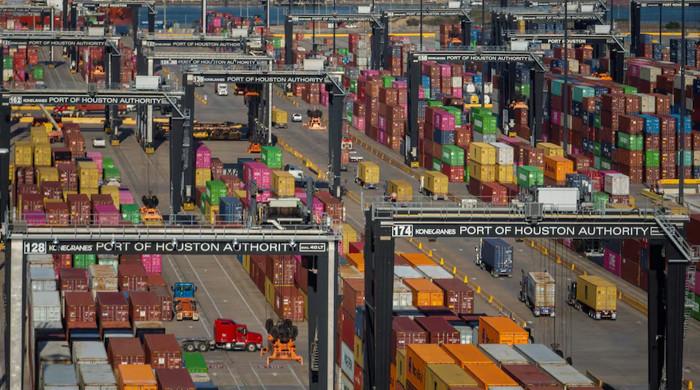Global Markets Rocked as Trump’s Tariffs Take Effect
- Chinese goods slapped with 104% tariffs.
- Duties target rivals and allies alike, risk recession.
- Global market sell-off resumes after brief respite.
BEIJING/WASHINGTON: On Wednesday, President Donald Trump’s “reciprocal” tariffs came into force, impacting numerous countries. These measures include substantial 104% tariffs on Chinese goods, intensifying the global trade war even as negotiations with some nations are anticipated.
These tariffs have disrupted the established global trading system, sparking recession fears and causing significant stock market declines worldwide.
Since Trump announced the tariffs a week prior, the S&P 500 has experienced a loss of nearly $6 trillion, marking the most severe four-day downturn since its inception in the 1950s. The index is approaching a bear market, defined as a 20% drop from its recent peak.
Asian markets experienced renewed selling pressure on Wednesday, with Japan’s Nikkei falling over 3%. South Korea’s currency reached a 16-year low, and government bonds suffered considerable losses as investors sought the safety of cash.
US stock futures also indicated a likely fifth consecutive day of losses on Wall Street.
Trump has presented conflicting messages regarding the permanence of these tariffs, initially describing them as “permanent” while also suggesting they are a tool to encourage other nations to negotiate.
“We have a lot of countries coming in that want to make deals,” he stated at a White House event on Tuesday afternoon. He later added that he anticipates China will also seek an agreement.
The Trump administration has scheduled discussions with key allies and trading partners, South Korea and Japan, while Italian Prime Minister Giorgia Meloni is expected to visit next week.
The Deputy Prime Minister of Vietnam, a significant low-cost manufacturing hub affected by some of the highest tariffs, is slated to meet with Treasury Secretary Scott Bessent on Wednesday.
While the prospect of these deals had briefly boosted stock markets on Tuesday, US stocks ultimately relinquished those gains by the day’s end.
China vows fight
In response to China’s retaliatory tariffs announced the previous week, Trump nearly doubled the duties on Chinese imports, raising them from 54%. China has pledged to resist what it perceives as blackmail.
Leading Chinese brokerages have committed to collaborate in stabilizing domestic share prices amid the tariff-induced market volatility.
Other countries are urgently working to shield critical industries from the impact of these duties. South Korea, for example, has announced emergency support measures for its auto sector, including tax reductions and subsidies.
Several economists caution that the ultimate burden of this trade war will likely fall on US consumers, who will face increased prices for a wide array of goods.
A recent Reuters/Ipsos poll indicates that nearly three-quarters of Americans anticipate rising prices for everyday items within the next six months.
The full effects of Wednesday’s tariffs may take time to materialize, as goods already in transit before midnight are exempt from the new levies, provided they arrive in the US by May 27.
Trump’s earlier across-the-board 10% tariffs on imports from numerous countries took effect on Saturday.
These latest duties, implemented at 12:01 a.m. ET (0401 GMT), target countries that Trump believes are “ripping off” the US.
The list includes close allies such as the European Union, which faces a 20% tariff along with industry-specific duties. The EU is scheduled to vote on initial countermeasures later on Wednesday.
Trump has asserted that these tariffs are a response to trade barriers imposed on US goods, which have hindered American businesses. He has also accused countries, including Japan, of manipulating their currencies to gain a trade advantage, an allegation Tokyo denies.
Japan’s finance minister stated on Wednesday that trade negotiations with Washington could potentially address foreign exchange rates.
Trump has hinted that further tariff actions may be forthcoming.
During a Tuesday evening meeting with Republican lawmakers, he mentioned plans to soon announce “major” tariffs on pharmaceutical imports, one of the few categories of goods thus far excluded from the new taxes.




Comments (0)
No comments yet. Be the first to comment!
Leave a Comment